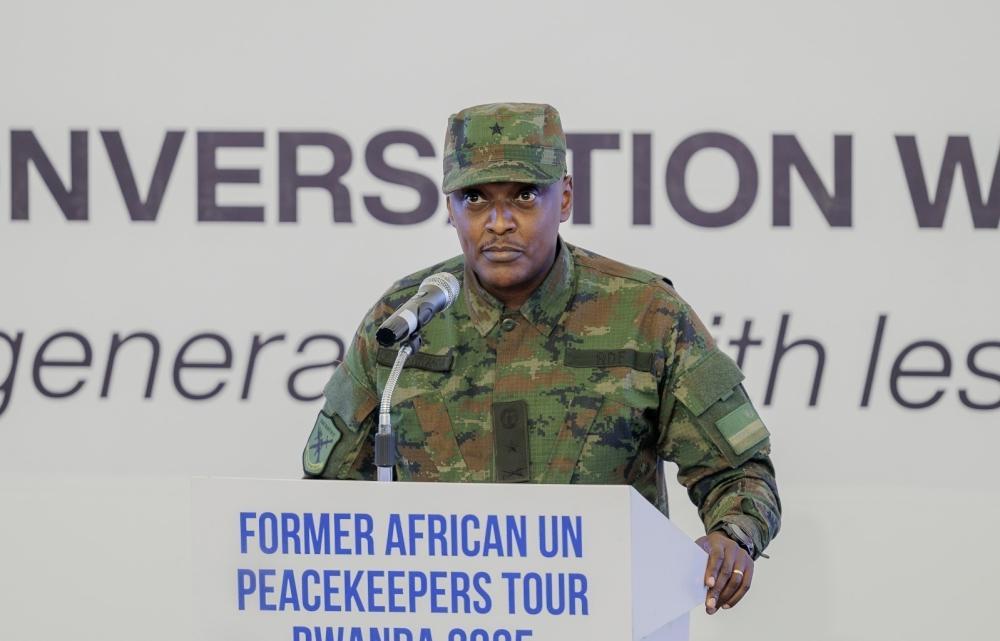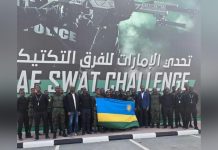Africa-Press – Rwanda. Rwanda Defence Force (RDF) Spokesperson Brig. Gen. Ronald Rwivanga has hailed the African UN peacekeepers who refused to leave Rwanda during the 1994 Genocide against the Tutsi, despite orders to withdraw, as a true example of standing firm for what is right, even when the rest of the world turns away.
He made the remarks at the Kigali Genocide Memorial during the official launch of the Rwanda Tour of African UN Peacekeepers, which will conclude on August 20.
The event was attended by officials from the Ministry of National Unity and Civic Engagement (MINUBUMWE), the Ministry of Defence, Aegis Trust, Isōko Centre for Humanity, youth champions, and the former peacekeepers themselves.
Speaking to Rwandan youth in attendance, Rwivanga said:
“In years to come, when people speak of your generation, may they say that you stood firm when it mattered most, and that you have held the same courage and humanity we honour here today. Let us begin not as an audience, but as a shared circle of answers, storytellers, and conspirators,” Rwivanga said.
He asked them to ask themselves what they would have done in their place and what they are planning to do in their own time, to stand for truth and humanity.
“Dear young people,” he said, “these veterans are living embodiments of what it means to stand firm for what is right, even when the world is walking away. Peace is not an abstract idea. It is lived, it is taught, and it is passed on.”
Rwivanga expressed gratitude to the Isoko Centre for Humanity, the Aegis Trust, and others who made the gathering possible.
He paid tribute to active and retired generals, and to former African UN peacekeepers. He reminded the audience that these men had defied orders to leave Rwanda, staying to protect civilians during “one of the darkest chapters in human history” when the UN Assistance Mission in Rwanda was under immense strain.
When the Belgian contingent withdrew and the UN Security Council voted to reduce the force, most countries pulled out their troops. Ghana and Senegal refused to do so.
Rwivanga recalled how Ghanaian peacekeepers continued protecting safe zones, negotiating with Interahamwe militias, and escorting civilians to safety, often with minimal resources. Senegalese peacekeepers did the same, facing personal danger after being accused by perpetrators of shielding targeted civilians.
The courage of Captain Mbaye Diagne of Senegal, who rescued many people “using only his wit and bravery” before being killed, was described as “one of the most inspiring acts of individual heroism in United Nations peacekeeping history”.
“These were not passive observers,” Rwivanga said. “These were active protectors, risking everything without international backing, guided only by conscience and values, empathy, collective responsibility, and human dignity.”
Veneranda Ingabire, the Executive Director for Memory and Genocide Prevention at MINUBUMWE, urged the youth to see the veterans as “living examples of what it means to be a person of their country”.
She called on them to choose courage over comfort, to protect those who cannot protect themselves, and to stand against genocide ideology in the region.
She described the former peacekeepers return as an act of human courage and a sign of their enduring connection to Rwanda.
“You have returned to a nation no longer defined by its past, but now united and building a hopeful future,” she said.
“The world knows the history of the genocide against the Tutsi, but many do not know the story of you, the few brave men who made the choice that defied all logic and command.”
She explained that their refusal to leave Rwanda after their mandate was withdrawn was not just defiance, but “a powerful affirmation that a peacekeeping mission is not merely a job, but a moral calling”.
Ingabire, who officially launched the seven-day interactive tour, which will take the veterans to sites they last stood on 31 years ago, described it as “a journey of memory, reflection, and shared humanity”, and a way to show them the nation that has risen from the ashes.
For More News And Analysis About Rwanda Follow Africa-Press






